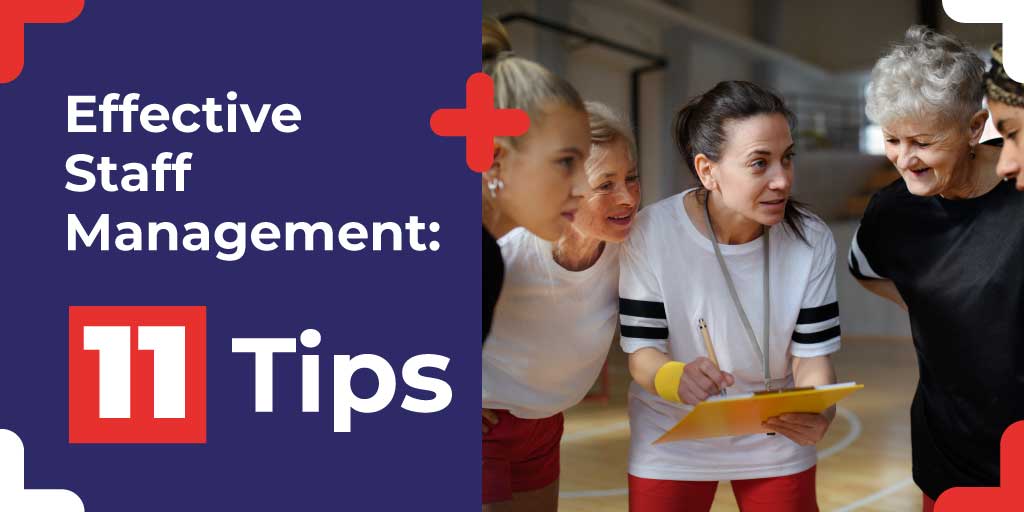With the focus of your day-to-day basis being onsite sports coaching, how to manage your team for efficient work can often be overlooked in the hustle. It is an essential part of effective coaching onsite – so we’ve created 11 tips to help you get the best out of your team and keep your sports program working at the top of its game.
Provide clear communication
Hold regular meetings to discuss goals, strategies, and any issues that arise. Encourage open communication between all staff members and ensure everyone feels heard and valued. If your team works remotely, onsite, or in different locales, use team collaboration tools designed for sports coaching to keep communication consistent.
Diversify your communication for the best results. Aside from team meetings, hold one-on-one check-ins and provide clear direction on roles, responsibilities, and expectations. Regular communication creates a positive work environment that will help you retain skilled coaching staff.
Define roles and responsibilities
Provide ongoing training and professional development opportunities to maintain your team morale and ultimately maintain service quality in your sports programs. Externally, encourage staff to pursue relevant certifications and continue their education. Invest in robust staff collaboration tools to help you manage and track their continued professional development (CPD).
Offer your staff chances to develop their skills by taking on new responsibilities to keep them engaged and help the team improve. It doesn’t have to be just sports coaching training, but tasks that improve leadership or enhance their digital skills.
Be an effective leader
Show effective leadership by leading by example. Demonstrate professionalism, dedication, and a strong work ethic. Encourage the delegation of responsibilities and trust your team to carry out their duties effectively. A trusted team is a proficient team, and one capable of handling problems as they arise effectively.
Effective leadership can help you manage and enhance your coaching professionalism. Effective leaders can resolve team conflicts, especially in remote conditions, using team collaboration tools designed for the sector to centralize your information and track conclusions.
Regular performance evaluations
Provide constructive feedback regularly to help staff improve. Use clear and measurable performance metrics to evaluate staff. However, it does go both ways. It’s essential to establish an environment of trust where staff feel comfortable providing feedback to you and each other. Listen to their input and perspectives.
Regular evaluations can also help resolve team conflicts in remote coaching. Problems like these can often affect your service quality and escalate quickly. E.g. If a staff member prints registers instead of using them digitally and is now causing administrative stress, offer them a quick run-down of how your internal CRM works and get them to practice it with you.
Offer team-building opportunities
Introduce cohesive activities. Organize team-building activities to strengthen relationships among staff. Even a night out or an opportunity to play games can foster a sense of unity and shared purpose that will create a positive work environment in your sports coaching company.
Cultivate a culture of respect, collaboration, and positive conduct among the coaching staff. Model these values yourself and recognize staff achievements. Start with your coaching philosophy. Understanding your values and goals can help you reward those with real promise and work ethic.
Manage resource allocation
Ensure staff have the necessary resources and tools to perform their jobs effectively. As the world digitalizes, establish mentorship programs and software packages like Coordinate Sport for scheduling and performance tracking to streamline your resource allocation process onsite and internally.
Trust your staff to handle their responsibilities and avoid micromanaging. Empower them to make decisions and take ownership of their role. Effective delegation through team collaboration tools, especially software can improve and centralize communication.
Conflict resolution
Conflict is an inevitable reality in the workplace. To resolve team conflicts, especially in remote coaching, respond to conflicts as they arise to prevent them from escalating. Use mediation techniques to resolve disputes amicably.
Utilizing software, in this case, means centralizing incidents for performance evaluation in a sports coaching environment. You can assess the impact of mediation and manage roles and responsibilities to prevent the same conflicts and aid a positive work environment in sports.
Recognition and rewards
As with conflict, it’s important to recognize success and achievement in a work environment. Incentivize good coaching skills and supporting schools with rewards for outstanding performance and centralize those achievements, using sports coaching software for performance evaluation and to manage coach progression.
Incentives and rewards are an easy way to build a positive and inclusive environment where all staff feel valued and respected. Rewarding team members for their performance helps retain skilled coaching staff. It offers role models for junior members and can maintain or even improve service quality in sports programs.
Adaptability and flexibility
You should be open to change. Be willing to adapt and make changes as needed based on feedback and evolving circumstances. Encouraging flexibility in approach and methods is essential to meeting the needs of the team and individual staff. It can also help to resolve team conflicts, especially in remote coaching actively.
With more teams working remotely, it’s important to organise and communicate how people work. Software for team collaboration can help equalize treatment in sports coaching programs. Active adaptation can improve performance evaluations, showing the best of your coaches because they nurture their working styles.
Health and wellbeing
Promote a healthy work-life balance for your staff. Support services should include providing access to support services for mental and physical health. A positive work environment can reduce and resolve team conflicts in remote coaching and maintain or improve team morale.
If the pandemic has shown anything, treating team members as individual people and having a well-rounded approach to their health can increase productivity and retention of staff.
At Coordinate Sport, we are committed to providing comprehensive software that engages, manages and supports your team in sports coaching. Contact the team today for your demo!









